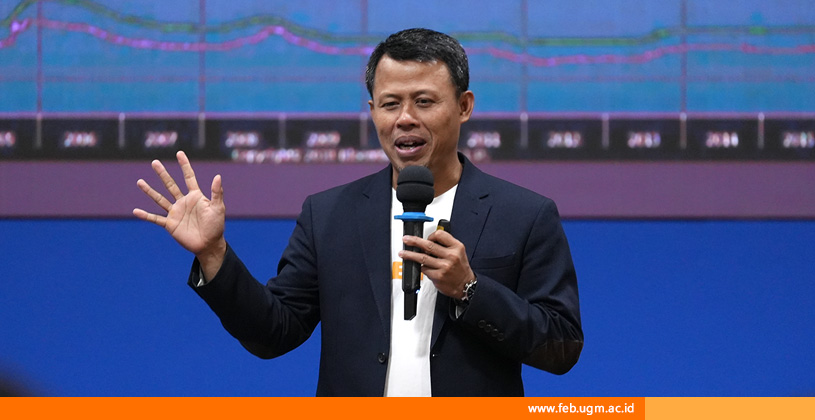The Role of Sharia in Building a Just Economy
- Details
- Written by Najwah
- Category: News
- Hits: 389

The Faculty of Economics and Business, Universitas Gadjah Mada (FEB UGM) hosted a guest lecture titled "Building a Digital Islamic Ecosystem through Mobile Banking" by M. Misbahul Munir, Senior Vice President of IT Strategic Planning Group at Bank Syariah Indonesia (BSI), at the FEB UGM Learning Center on Thursday, October 24.
In his presentation, Munir highlighted the critical role of Shariah in creating a more just and humane economic system. He began the session by reviewing classical economic thought, such as that outlined by Adam Smith in his book The Wealth of Nations. According to Munir, classical economics emphasizes self-interest and capital accumulation as the drivers of economic growth. This model encourages economic practices, including banking contracts, that can harm one party, as in the case of compound interest in Nigeria. Many people there find themselves trapped in long-term debt because of compounding interest.
For this reason, Islamic economics emerges as an alternative to creating a more prosperous and just society. Unlike capitalist economies, which impose high penalties and fines, Sharia offers a more humane solution. In Islamic law, personal mistakes are not compensated with fines or penalties but by helping those in need.
"In Islam, compensation for breaking a promise can be made in three ways: feeding the poor, clothing the needy, or freeing the enslaved. If someone cannot do any of these, he can fast for three days," Munir explained on Thursday (10/24).
Munir further emphasized that Sharia economic contracts, including banking contracts, are based on the principles of Maqashid Sharia, which rejects interest (riba) and fraudulent practices. He referred to Surah Al-Baqarah, verse 275, which states that all forms of buying and selling are permissible except those involving interest. Islamic banks apply these principles as financial institutions based on Islamic law. For example, they do not impose fines on customers who default on their loans. Instead, they charge an administrative collection fee and use the proceeds for corporate social responsibility (CSR) activities.
"This money cannot be treated as profit; instead, it is used to benefit the community through CSR programs such as building mosques and providing social services," says Munir.
During the guest lecture, there was also a live demonstration of online onboarding through the super app BYOND by BSI. This app aims to make Sharia-compliant financial services more accessible to the public.
“People need something practical and enjoyable. That’s why BSI serves all segments of society, from MSMEs to corporations, allowing them to conduct transactions within our digital banking ecosystem,” Munir added.
Bayu Sutikno, S.E., M.S.M., Ph.D., Vice Dean for Academic and Student Affairs at FEB UGM, welcomed the collaboration with BSI through the guest lecture. "In business education, there are two ways to bring students closer to the industry: sending students to the industry through internship programs like Kampus Merdeka or bringing industry experts to campus. I hope this public lecture will give students valuable insights and new perspectives," said Bayu.
This guest lecture is expected to enhance students' understanding of Islamic banking and create greater interest in using Islamic banking products.
Reportage: Najwah Ariella Puteri
Sustainable Development Goals






